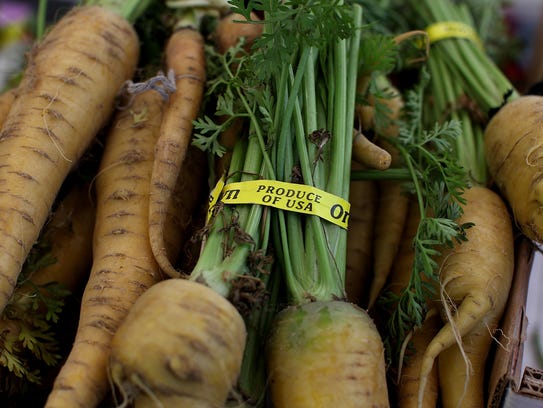More shoppers buying 'natural' food, yet most don't know what it means
Source: USA TodayThe U.S. has a confused consumer epidemic — more shoppers are seeking foods labeled "natural" despite not fully understanding what the claim means.
The percentage of people who regularly buy food labeled natural has grown from 59% in 2014 to 62% in 2015, yet confusion abounds, according to research out Wednesday from Consumer Reports. The study shows the majority of people don't know what they're paying for when it comes to natural labels. At the same time, pressure is mounting to define a term that's never been legally regulated.
At least 60% of people believe a natural label means packaged and processed foods have no genetically modified organisms, no artificial ingredients or colors, no chemicals and no pesticides, according to the study by Consumer Reports. And 45% think that natural is a verified claim. It's not.
In fact, none of those attributes is necessarily true, because use of the word is not regulated. At least, not yet.
The report comes as the Food and Drug Administration takes a closer look this year at how the term is used, whether it should be defined and how. A public comment period is taking place through May 10, according to the FDA site.
"Natural" is a seemingly straightforward word that's taken on an increasingly confounding meaning as our food preferences and definition of health evolve. The FDA does not formally define the word, meaning its use isn't regulated by any law. A "longstanding policy" interprets it to mean nothing artificial or synthetic has been added to a food that wouldn't normally be expected in that food, according to the FDA website. But the policy isn't intended to address food production, processing or manufacturing methods.
Organizations, including Consumer Reports and the Grocery Manufacturers Association, have been urging the FDA to define the term in recent years, as shoppers have moved away from processed and packaged foods and food companies have pledged to phase out artificial ingredients.
 |
| Defining what constitutes "natural" food may be an elusive task. As David Just, a professor of behavior economics at Cornell University, points out, it's not as if we're able to buy "naturally-occurring wild carrots." (Photo: Justin Sullivan, Getty Images) |
"The problem with having all these misleading labels is it creates a lot of green noise in the marketplace," says Urvashi Rangan, director of food safety for Consumer Reports. "If we think about wanting better food-production systems, then we need to provide meaningful choice to people."
Adding to the complexity of a potential national standard is the fact that what shoppers consider meaningful food purchases now includes a long list of health, safety and sustainability attributes. We're no longer buying solely based on taste and convenience, according to a report out this week from consulting firm Deloitte, in partnership with the Food Marketing Institute and Grocery Manufacturers Association.
So shoppers are on the lookout for certain words, and use them as purchase signals regardless of whether the claims are regulated or not, says David Just, a professor of behavioral economics at Cornell University.
Read the entire article on USA Today: http://www.usatoday.com/story/money/2016/01/27/most-shoppers-dont-understand-natural-food-labels/79346088/


No comments:
Post a Comment